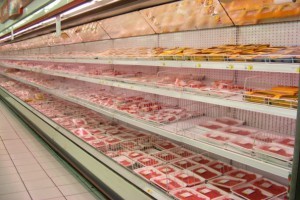Laugh? Cry? UK Plans to Let Big Biz Police Itself
The UK Department of Food and Rural Affairs (Defra) has a plan: Businesses should have a bigger say in how regulations are enforced.
By Eve Mitchell
 The UK Department of Food and Rural Affairs (Defra) has a plan: Businesses should have a bigger say in how regulations are enforced.
The UK Department of Food and Rural Affairs (Defra) has a plan: Businesses should have a bigger say in how regulations are enforced.
Admitting a “significant shift” in its press release, Defra “hailed a change that puts business in charge of driving reform.” The goal is “lightening needless burdens without weakening essential controls.” This made me squirt tea out my nose.
To share a few recent examples of the way “needless burdens” are holding back food business:
1) Horsemeat is still present in European beef supplies, and the UK government is reportedly stalling the release of a now 16-month-old investigation report. Publication is said to be “blocked amid government concerns that the public would be frightened by the idea that criminals were still able to interfere with their food.” Too right. All the promises about the “integrity” of our food system from supermarkets, and all the reassurance from the government that meat is safe because it is traceable, yet we still don’t know where the horse came from, who did it, or what will be done about it. Hard to see the needless burdens there.
2) The fallout from the Guardian expose on the scandalous things going on in the UK poultry industry grows ever murkier. Having been told by the Food Standards Agency (FSA) that it inspected the factories concerned and gave them ratings of “good” and “generally satisfactory” (makes your mouth water, no?), we have since learned that in fact the FSA now admits that “dirty birds from the floor being thrown back into food production [was] a serious breach.” The “needless burden” of regulation means that no penalties will be issued as the company says it’s fixed the problem. As of today the FSA website still says it “will publish the completed audits in due course.”
3) Then there’s the salmon labelled “wild Scottish” in supermarkets that turns out to be intensively farmed Norwegian fish. “Foreign-owned corporations are exploiting the world-renowned and prized image of Scottish salmon – an iconic image of Scotland – to obtain a price premium.” International industrial fish giant Marine Harvest insists the industry is “heavily” or “highly regulated” (in Scotland in 2012 here, and in Ireland in 2013 here). Yet oddly, despite the huge furore over horsemeat labelled as beef, this burden apparently does not mean we can always tell what’s being sold on supermarket shelves.
4) Meanwhile, the ongoing European salmonella outbreak shows us how dangerous failure is in a complex international food supply chain. It reminded me, naturally enough, that on July 28 jury selection started in the U.S. federal trial of three former Peanut Corporation of America bosses over the vast salmonella food recall in 2008-9. The three face a 76-count indictment that they “created fake certificates showing their products were uncontaminated when laboratory results showed otherwise.” One defendant admitted to faking documents. No mere infringement, we learn the plant was “not fit to produce products for human consumption.” For readers unfamiliar with the case, 714 people in 46 states were infected and nine people died in the outbreak. For Americans this is also contamination on an iconic level – contaminated peanut butter gets right to the heart of things, like school lunchboxes, and deliberate adulteration of food is exactly the kind of thing that regulation is supposed to prevent. This failure of proper enforcement, and how far the impacts can travel, is also exactly the kind of thing we need to worry about as the US EU trade negotiations continue.
There are other signs of strain in our food supply, too. At the end of July an antibiotic banned since 1995 as an increased cancer risk turned up in animal feed supplied by a Dutch company to farms in several other EU countries. Since in all likelihood this feed has already been used, it may be necessary to cull as many as 12,700 cattle and 50,000 pigs to clear the drug from the food system. Amid all of this, UK meat inspectors have gone on strike because the FSA refused to give them a 1 percent cost of living pay rise. If these are the problems we know about, I for one am worried about what we don’t yet know, and who’s looking out for us if the inspectors are this angry.
As citizens we’ve had to get used to having serious questions to our government answered by emails that sign off “Regards, Customer Contact Unit, Defra”, but inviting industry to regulate itself in such circumstances is surely taking this business-friendly thing a bit too far.


